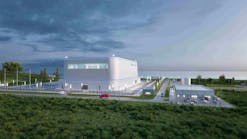Bakken Energy signs H2 Research deal with Air Force Base in North Dakota
Hydrogen development firm Bakken Energy has signed a Cooperative Research and Development Agreement (CRADA) with the Grand Forks Air Force Base (GFAFB) to explore possible applications of clean hydrogen.
The agreement was signed and celebrated at the on-base North Spark Defense Laboratory, which was opened earlier this year to spur innovation for the benefit of airmen. Grand Forks is home to the 319th Reconnaissance Wing of the USAF.
“Public and private partnerships are essential to creating carbon-neutral solutions in real world applications,” said Lt. Col. Michael Dunn of the North Spark Defense Laboratory. “Energy is a big part of mission readiness and alternative energy sources provide flexibility for operations. The Department of the Air Force is always looking for ways to implement alternative energy solutions to benefit the environment and to keep us mission ready. We look forward to exploring practical uses of hydrogen with Bakken Energy.”
Clean, or green hydrogen, promises the use of energy-dense fuel which is carbon free. Hydrogen does not contain carbon and does not emit CO2, but must be created by electrolysis powered by renewable resources to be classified as green H2.
“The GFAFB is a welcomed addition to the Heartland Hydrogen Hub we are developing with the states of North Dakota, Wisconsin, Minnesota and Montana,” said Steve Lebow, Chairman and Founder of Bakken Energy. “Our Heartland Hydrogen Hub is a leading contender for regional hydrogen hub funding for three reasons. First, the Hub is built on the foundation of our large-scale affordable hydrogen production. Second, Bakken Energy’s partnering with the MHA Nation to solve the flaring problem on the reservation. Lastly, our commitment to build the connective infrastructure from supply to regional hydrogen demand. The GFAFB partnership adds another important attribute: innovating new applications for our clean hydrogen.”
Last month, Bakken Energy signed a Memorandum of Understanding with Cummins and Schneider National Carriers to jointly work on the Heartland Hydrogen Hub, which is being designed in conjunction with the states of North Dakota, Minnesota, Wisconsin and Montana.
Governors of those states previously signed agreements to support the project. The hub, which will receive federal funding through the $7 billion Regional Clean Hydrogen Hubs program of the Department of Energy, will meet the requirements of long-haul trucking.





